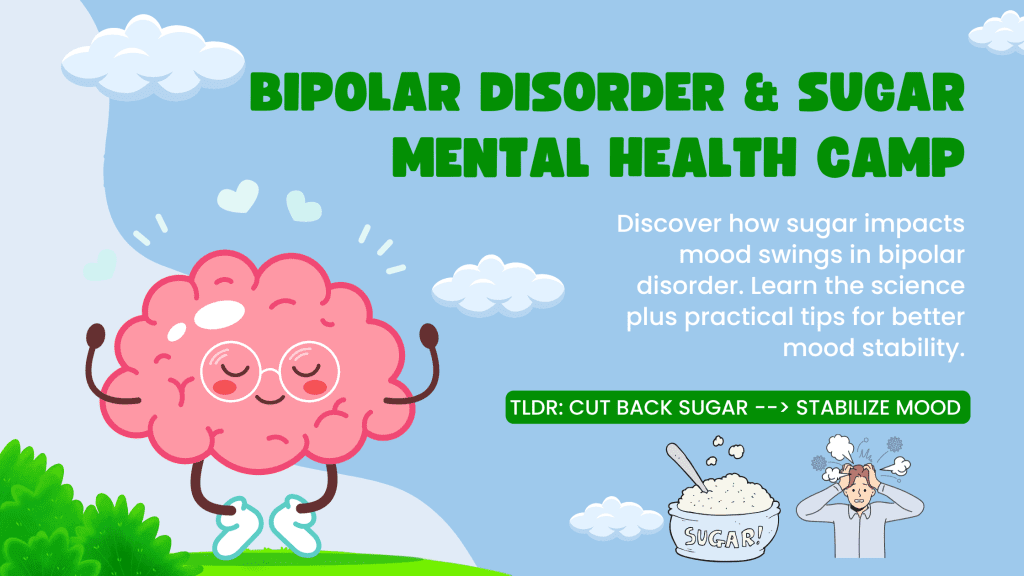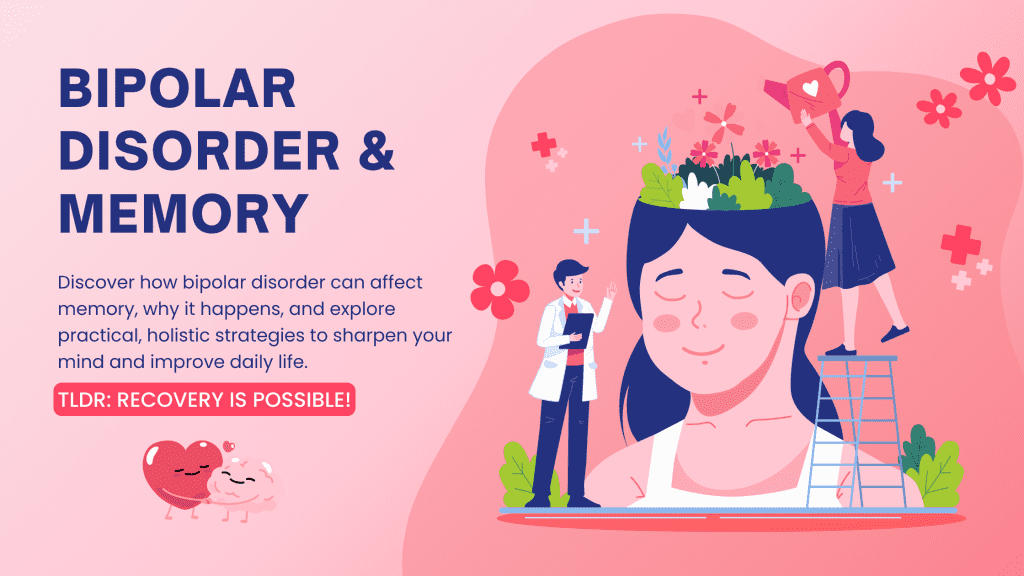Bipolar Disorder & Sugar
Bipolar Disorder & Sugar How Sugar Affects Mood Stability in Bipolar Disorder Living with bipolar disorder means navigating intense emotional highs and lows. While medication and therapy are crucial, everyday choices-like what we eat-play a bigger role than many realize. One of the most common but overlooked triggers for mood swings? Sugar. Research and personal stories show that the relationship between bipolar and sugar is complicated, often creating a cycle of temporary relief followed by deeper instability. Let’s break down why sugar impacts mood and how to build healthier habits. For more guidance on bipolar disorder, check out our book and masterclass to reclaim control of your life. You can also check out our free resources. The Rollercoaster of Blood Sugar and Mood Sugar has a direct line to our brain’s chemistry. When someone with bipolar disorder eats sugary foods, their blood glucose levels spike rapidly. This surge can mimic the energy rush of a manic episode, creating a false sense of euphoria. But what goes up must come down. After the spike, blood sugar crashes, leading to fatigue, irritability, and depressive feelings. For people already prone to mood swings, this rollercoaster can intensify symptoms. Imagine this: During a depressive episode, you reach for candy to lift your spirits. It works-for about 20 minutes. Then, the crash hits, leaving you more drained than before. Over time, this pattern can make it harder to distinguish between natural mood cycles and sugar-induced shifts Sugar’s Sneaky Impact on Mental Health 1. Brain Chemistry Confusion Sugar temporarily boosts dopamine, the “feel-good” chemical. But over time, excessive sugar dulls the brain’s response to dopamine, making it harder to feel joy without sugary treats. For people with bipolar disorder, this can deepen depressive episodes or trigger cravings during manic phases. 2. Inflammation and Mood Refined sugars fuel inflammation, which is linked to worse bipolar symptoms. Studies show that inflammatory molecules can disrupt brain function, worsening depression and anxiety. Reducing sugar intake may lower inflammation, creating a calmer mental environment. 3. The Guilt Factor Many people with bipolar disorder report feeling guilty after sugar binges, especially if weight gain or loss of control becomes an issue. This guilt can spiral into shame, feeding the cycle of emotional eating. Practical Tips for Managing Sugar Cravings 1. Swap Smartly Replace sugary snacks with fiber and protein: nuts, Greek yogurt, or veggies with hummus keep blood sugar steady. Try natural sweeteners: Fruits like berries or apples satisfy sweet cravings without the crash. Honey is also a great sweetener to replace in your coffee and tea. 2. Track Triggers Keep a mood and food journal. Note when sugar cravings hit-are you stressed, bored, or in a depressive phase? Patterns reveal emotional eating habits. 3. Stay Hydrated Thirst often masquerades as hunger. Drink water first when a craving strikes. Add lemon or mint for flavor without sugar. 4. Explore Supplements Some find supplements like Banaba leaf extract helpful for balancing blood sugar. Always consult a doctor first, especially if taking bipolar medications. Why a Balanced Diet Matters for Bipolar Stability While no single diet “cures” bipolar disorder, research shows that nutrient-rich foods support mood stability. Key strategies include: Prioritizing whole foods: Vegetables, lean proteins, and whole grains provide steady energy. Reducing processed carbs: White bread and pasta act like sugar in the body, spiking glucose levels. Omega-3 fats: Found in fish and walnuts, these fight inflammation and support brain health. Here is a whole blog post regarding diet and bipolar disorder. The Bigger Picture: Small Changes, Big Results Managing bipolar and sugar isn’t about perfection. It’s about awareness and gradual shifts. Start with one change-like swapping soda for sparkling water-and build from there. Over time, these choices add up to fewer mood swings and more emotional balance. As David Comisar, a therapist, notes: “Sugar offers a quick fix, but stability comes from nurturing your body and mind every day”. By understanding sugar’s role and taking small steps to reduce it, people with bipolar disorder can reclaim power over their moods and overall well-being. In the end, the goal isn’t to eliminate sugar entirely but to break its hold on your emotional health. With patience and support, it’s possible to enjoy life’s sweetness without the bitter aftermath. Citations: https://www.bphope.com/treatment/diet/ http://designfeaster.blogspot.com/2013/11/bloggers-questionnaire-bp-of-even-if.html https://hupcfl.com/harmony-and-self-esteem-nurturing-psychological-well-being-through-positive-practices-and-psychiatric-care/ https://theharmonycompany.com/products/sugarsolve https://www.bphope.com/bipolar-sugar-moods/ https://viva.pressbooks.pub/openmusictheory/chapter/intro-to-harmony/ https://bpharmony.com/lifestyle-changes-for-bipolar-disorder/ https://www.bphope.com/bipolar-sugar-balance-mood/ https://pubmed.ncbi.nlm.nih.gov/22621171/ https://www.instagram.com/bpharmony_/p/DDZoG8zNuQa/?api=1%2F https://www.nutritionbycaroline.com/blog/2019/8/15/sweet-harmony-is-your-sugar-intake-affecting-your-mood https://pmc.ncbi.nlm.nih.gov/articles/PMC7824587/ https://www.bphope.com/how-bipolar-disorder-increases-your-risk-of-developing-type-2-diabetes/ https://www.bridgestorecovery.com/blog/managing-bipolar-disorder-and-diabetes-concurrently-promotes-and-enables-stability/ https://woodstockvitamins.com/product/blood-sugar-harmony-90-capsules/ https://www.bphope.com/author/jp/ https://www.walmart.com/ip/Healths-Harmony-Balance-Plus-Supplement-Avoid-The-Daily-Peaks-And-Troughs-Energy-Mood-Focus-Metabolism-Weight-Natural-Herb-Support-60-Capsules/186679371 https://www.linkedin.com/company/bipolar-harmony https://www.harmonyridgerecovery.com/blood-sugar-and-cravings-in-recovery-the-hidden-connection/ https://colibriwp.com/blog/blog-design/ https://pmc.ncbi.nlm.nih.gov/articles/PMC10525342/ https://www.everydayhealth.com/bipolar-disorder/the-five-worst-foods-for-bipolar-disorder.aspx https://www.writingforums.com/threads/harmony-in-your-writing.202277/ https://www.youtube.com/watch?v=sXkNFOPBWHA https://www.thejazzpianosite.com/jazz-piano-lessons/jazz-chord-voicings/tone-clusters-secundal-harmony/ https://www.psychologytoday.com/us/blog/where-science-meets-the-steps/201406/giving-nutrition-its-due-in-bipolar-disorder-treatment https://www.youtube.com/watch?v=di4x4d8lyyg https://www.sciencedirect.com/science/article/abs/pii/S0165032721014270 https://www.linkedin.com/posts/bipolar-harmony_what-is-bp-harmony-a-service-for-longitudinal-activity-7245085472878682114-oSnW https://www.instagram.com/bpharmony_/reel/DICWltDyeqL/?locale=ko-KR https://www.localhouseofhealth.com/product/blood-sugar-harmony/ https://bpharmony.com/tag/recovery/ https://www.musical-u.com/learn/songwriters-secrets-writing-harmonies/ https://icmp-elevate.com/your-guide-to-harmonies-music-and-songwriting https://successmusicstudio.com/harmony-is-tone-color/ https://www.reddit.com/r/explainlikeimfive/comments/1sc93t/eli5_difference_between_melody_harmony_rhythm/ https://www.huffpost.com/entry/bipolar-disorder_b_5578079 https://www.harmonyridgerecovery.com/why-do-recovering-alcoholics-crave-sugar/ https://www.youtube.com/watch?v=7Sajm6bSxGk https://happymammoth.com/pages/glow-with-harmony https://www.youtube.com/watch?v=5C2YbwgXMgM https://www.elsevier.es/en-revista-european-journal-psychiatry-431-avance-resumen-bipolar-disorder-type-2-diabetes-S0213616321000653?esCovid=Dr56DrLjUdaMjzAgze452SzSInMN&rfr=truhgiz&y=kEzTXsahn8atJufRpNPuIGh67s1 https://www.sciencedirect.com/science/article/abs/pii/S0213616321000653 https://pmc.ncbi.nlm.nih.gov/articles/PMC4936996/ https://www.healthyplace.com/diabetes/mental-health/how-does-diabetes-affect-bipolar-disorder https://www.nature.com/articles/s41386-022-01471-6 https://www.psychiatrictimes.com/view/diabetes-bipolar-disorder-takes-its-toll https://bpharmony.com/blog/ https://bpharmony.com https://www.instagram.com/bpharmony_/p/DH8a7-AulqD/?locale=zh_CN https://www.instagram.com/bpharmony_/p/DH0rGM9u-78/ https://www.bphope.com/blog/ https://www.thebpblog.com/2019/05/19/the-bp-blog/ https://www.bphope.com/home-third-blog-posts/ https://bpcan.com


